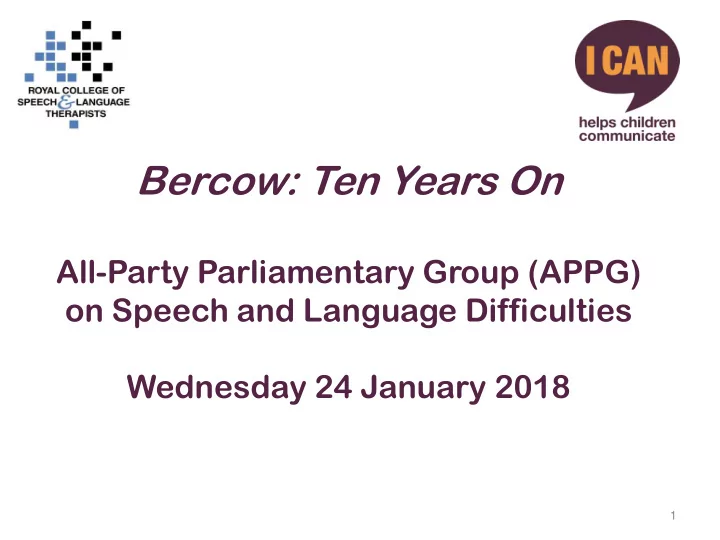

Bercow: Ten Years On All-Party Parliamentary Group (APPG) on Speech and Language Difficulties Wednesday 24 January 2018 1
2008: 8: The Bercow cow Repor port 2
2018: 8: Bercow: cow: Ten n Year ars s On n A review of the state of provision for children’s speech, language and communication needs (SLCN) in England. January 2017 March 2018 Evidence Influence and Recommendations Report gathering inform Bercow10@ican.org.uk #Bercow10 3
The e evidence idence and d wh what t it it tells lls us 4
Evidence idence Through a combination of surveys, focus groups, oral and written evidence, we heard the views of: • Children and young people • Parents and carers • Practitioners • Employers • Commissioners 5
Good od news ws • Expertise in schools and early years staff • Youth justice • Augmentative and Alternative Communication (AAC) • Local good practice o No Wrong Door o Greater Manchester Early Years Pathway o Peterborough and Cambridgeshire Joint Commissioning Unit 6
Childr ildren en an and d young ng pe people ople Don’t like Like Be good at explaining Too much teacher talk Encourage us Teachers shouting Make it easy to ask questions People talking too much / being Make things fun noisy Be patient Working in silence Pictures/visual support Lots of writing Check I understand Spending time on naughty children Give choices Give time to talk Don’t speak too fast Give help with work 7
Vie iews ws fr from om pa parents nts an and d ca carer ers How did you know your child was struggling? I can't remember A professional pointed 2% it out 12% I knew comunication milestones 28% It was obvious 43% I compared my child to others 15% 8
Vie iews ws fr from om pa parents ents and d carer ers How easy was it to get help for your child with their SLCN? Very Easy 6% Quite Easy 21% Very Difficult 45% Quite Difficult 28% 9
Vie iews ws fr from om pa parents ents and d carer ers Overall , my family’s experience of speech, language and communication support is that it is: Excellent 13% Good 18% Poor 52% Satisfactory 17% 10
Vie iews ws fr from om pa parents ents and d carer ers “ Her downward spiral into the friendless, socially isolated, dependent 17-year-old we have today has been heart- breaking to see.... What has been difficult? Not having Rebecca’s needs identified in primary school .” Parent, oral evidence session on low incidence, high need conditions 11
Evi vidence: dence: themes emes Early School support identification Commissioning and intervention Speech and language Evidence base Wider workforce therapy and data workforce Raising Service models awareness 12
School hool suppor pport The way children and young people learn in schools these days supports their speech, language and communication development: Strongly agree Strongly disagree 6% 13% Agree 41% Disagree 40% 13
Id Ident entif ifica ication tion In my local area, the expertise of school and early years staff to identify and support children and young people's speech, language and communication is: Excellent 9% In need of significant improvement 23% Good 39% Satisfactory 29% 14
Id Ident entif ifica ication tion “I think there’s a really serious issue around teacher training because they get very little input on language and they’re having to deal with teenagers who are very difficult to communicate with… I think it’s a real area where teachers need more help, they need more skills.” Professor Karen Bryan OBE, oral evidence session on the impact of unsupported SLCN 15
Commi mmissioning ssioning In my local area, commissioners' understanding about the importance of speech, language and communication is: Excellent 4% Good In need of significant 25% improvement 38% Satisfactory 33% 16
Commi mmissioning ssioning “Joint commissioning is challenging but still offers us our best chance of a robust system of change in this area and even though we have been at it for a long time now with some success, but we’re not by any means there altogether .” Marie Gascoigne, oral evidence session on joint commissioning 17
Workf kfor orce ce “We still find that midwives, health visitors, teaching staff, apprentices have virtually nothing on child development [in their initial training] and absolutely nothing on language and communication skills .” “A worrying descent to a lower denominator has seen the reduction in senior posts and so specialist knowledge of speech, language and communication needs has gone both in education and speech and language therapy services” 18
Access cess to o su supp ppor ort Speech and language therapy for children and young people in my area is: Available as required Not sufficiently 15% available 22% Only available for a Available but not limited number of meeting the needs children 40% 23% 19
Recomme commenda ndation tions 20
Recomme commenda ndations ions will ll addr dress ess the followi lowing ng areas: eas: • Centrality of spoken language to life chances • Children are still being missed • An accessible and equitable service • Effective support • Integrated systemic change 21
Next xt st steps • Finalising report and recommendations for government and decision makers • Developing: o Calls to action: bold first steps for everyone o Resources and collateral: getting the message out • Breakfast launch at Speaker’s House on 20 March 22
The he Ber ercow: cow: Ten n Year ars s On On revie iew w ne needs eds you ou To help inform the final report, we would welcome your: • feedback on findings o Is there anything you think is missing? • advice on recommendations o What recommendations would you like to see in the report? • advice on promotion 23
Thank ank you ou 24
Recommend
More recommend